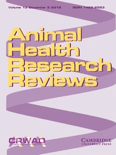
ANIMAL HEALTH RESEARCH REVIEWS
Scope & Guideline
Innovating the future of animal health and welfare.
Introduction
Aims and Scopes
- Veterinary Pharmacology and Therapeutics:
The journal covers the use of various therapeutic agents, including antibiotics, essential oils, and probiotics, to improve animal health and productivity. - Animal Nutrition and Dietetics:
Research related to dietary components, such as fiber and butyric acid, and their impact on animal health, performance, and welfare is a core focus. - Disease Management and Prevention:
The journal emphasizes studies on disease control, management strategies, and the impact of infectious diseases on animal populations. - Animal Welfare and Behavior:
Exploration of animal welfare considerations, including pain management and welfare implications of farming practices, is an essential aspect of the research. - Emerging Technologies in Animal Health:
The integration of new technologies, including artificial intelligence and molecular genetics, to enhance animal health and production is a unique contribution of the journal.
Trending and Emerging
- Probiotics and Microbiome Research:
There is a growing trend towards the application of probiotics and the study of the microbiome in various species, reflecting increased interest in gut health and its impact on overall animal performance. - Alternative Therapeutics and Natural Remedies:
Research focusing on alternatives to conventional antibiotics, including essential oils and phytochemicals, is on the rise, driven by the need for sustainable practices in animal production. - Digital Transformation and AI in Animal Health:
The incorporation of digital technologies and artificial intelligence in veterinary practices and animal farming is emerging as a significant theme, pointing towards innovative management and health monitoring solutions. - Systematic Reviews and Meta-analyses:
There is an increased emphasis on systematic reviews and meta-analyses, indicating a trend towards synthesizing existing research to guide evidence-based practices in veterinary medicine. - Zoonotic and Vector-borne Diseases:
Research addressing zoonotic diseases and their implications for both animal and human health is gaining traction, underscoring the interconnectedness of animal health and public health.
Declining or Waning
- Traditional Antibiotic Use:
There has been a noticeable decline in research focusing on traditional antibiotic usage in animal husbandry, possibly due to the increasing emphasis on alternatives and the global push for antibiotic stewardship. - Non-communicable Diseases in Animals:
Research on non-communicable diseases, such as metabolic disorders in livestock, has been less prominent in recent years, indicating a potential waning interest compared to infectious diseases. - Conventional Breeding Practices:
Studies centered on traditional breeding methods appear to be decreasing, likely overshadowed by the rise of genetic and genomic technologies that promise more significant advancements in animal health.
Similar Journals
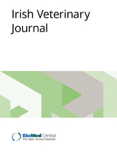
IRISH VETERINARY JOURNAL
Unlocking the potential of veterinary research for all.IRISH VETERINARY JOURNAL is a premier open-access publication in the field of veterinary science, established to disseminate high-quality research and innovations that advance the veterinary profession and animal health. Published by BMC since 2004, this journal not only ensures worldwide access to cutting-edge findings but also maintains an impressive ranking as Q1 in the Veterinary (miscellaneous) category according to the 2023 metrics, highlighting its significance and influence. With an impressive Scopus rank of #19/194 and a 90th percentile placement, it provides a robust platform for researchers, professionals, and students alike to engage with the latest studies, reviews, and case reports. The journal's coverage spans from its inception in 1973 to the present, catering to a diverse audience interested in various aspects of veterinary science, ensuring that it remains an essential resource for those passionate about the welfare of animals and the advancement of veterinary practices.

Indian Journal of Animal Research
Pioneering Research in Animal Science and Veterinary MedicineIndian Journal of Animal Research is a prominent publication in the field of animal science and veterinary medicine, established to advance the understanding of animal husbandry, biology, and health. Published by the AGRICULTURAL RESEARCH COMMUNICATION CENTRE, this journal has been contributing to the scholarly discourse since 2008, with a commitment to high-quality research dissemination. With its current Q3 ranking in both Animal Science and Zoology and Veterinary (miscellaneous) categories, it serves as a crucial platform for researchers aiming to share insights and innovations within these disciplines. Although it operates without open access, it remains widely recognized, fostering a collaborative academic environment. The journal's impact is underscored by its presence within the Scopus database, providing valuable rankings in both General Veterinary and Animal Science and Zoology fields. Researchers, professionals, and students interested in veterinary advancements and animal research will find this journal a valuable resource for the latest scientific findings and discussions. Join the community of scholars igniting progress in the vital realm of animal research.
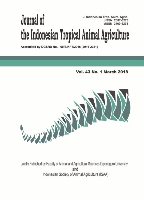
Journal of the Indonesian Tropical Animal Agriculture
Connecting Academia and Practice in Veterinary ScienceJournal of the Indonesian Tropical Animal Agriculture is an esteemed peer-reviewed journal published by UNIV DIPONEGORO, focusing on the dynamic fields of animal science and veterinary medicine. Since its inception in 2009, the journal has maintained an open access policy, ensuring that valuable research is freely available to the global scientific community. Based in Indonesia, the journal has adapted to the evolving agricultural landscape and now contributes significantly to both local and international discourse on tropical animal husbandry. With a Scopus rank placing it within the 36th percentile for general veterinary sciences and the 25th percentile for animal science and zoology, it is emerging as a valuable resource for researchers and professionals alike. The journal covers a broad range of topics within its scope, fostering innovative approaches and solutions tailored to the unique challenges of the tropical environment. By exploring critical issues in animal agriculture, this journal not only enhances academic knowledge but also supports sustainable practices within the industry. We invite researchers, students, and professionals in the realm of veterinary science and animal agriculture to engage with the rich array of research presented in this journal.
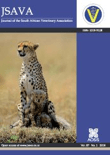
Journal of the South African Veterinary Association
Championing Veterinary Knowledge Since 1945Journal of the South African Veterinary Association is a prominent Open Access journal dedicated to advancing the field of veterinary science since its inception in 1945. Published by MEDPHARM PUBLICATIONS PTY LTD, this journal stands out with an impactful HIndex and a commendable categorization in 2023, ranking Q3 in Medicine (miscellaneous) and Q2 in Veterinary (miscellaneous). With a Scopus rank of 96 out of 194 in the veterinary field, it serves as an essential resource for researchers, veterinary professionals, and students, promoting the dissemination of high-quality research and knowledge. The journal offers a platform for peer-reviewed articles covering diverse topics relevant to veterinary and animal health issues, encouraging expansive dialogue and collaboration within the academic community. Based in Centurion, South Africa, and accessible globally since it adopted an Open Access model in 1997, the journal exemplifies a commitment to accessibility and the sharing of knowledge.
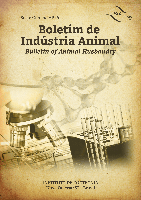
BOLETIM DE INDUSTRIA ANIMAL
Empowering Research for Sustainable Animal ProductionBOLETIM DE INDUSTRIA ANIMAL is a prominent academic journal dedicated to the field of animal industry, published by the Instituto de Zootecnia. As an Open Access journal since 1974, it provides a vital platform for researchers, professionals, and students to disseminate knowledge and advancements in animal production, husbandry, and veterinary sciences. With its commitment to enhancing the visibility and accessibility of research, BOLETIM DE INDUSTRIA ANIMAL encourages rigorous scientific inquiry and innovation within its community. The journal presents a rich repository of articles encompassing a wide range of topics related to animal science and industry practices. Published in Brazil and accessible globally, it aims to foster collaboration and knowledge exchange among scholars, ultimately contributing to the advancement of sustainable practices in the agricultural and animal husbandry sectors.
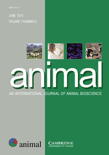
Animal
Connecting researchers for a sustainable future in animal welfare.Animal is a leading academic journal published by Elsevier that stands at the forefront of research in the field of Animal Science and Zoology. Founded in 2007, it has rapidly garnered a prestigious reputation, achieving a remarkable Q1 ranking in its category for the year 2023, placing it in the top 4% of journals in the discipline. With an impressive impact, as indicated by its rank of 19 out of 490 in Agricultural and Biological Sciences on Scopus, this journal serves as a vital platform for researchers, professionals, and students to disseminate groundbreaking findings and interdisciplinary studies. Animal not only offers paid subscription access but also provides an option for Open Access, thereby enhancing the visibility and reach of significant research contributions. With its comprehensive scope and commitment to advancing the understanding of animal biology, behavior, and welfare, Animal plays a crucial role in shaping the future of animal science. For anyone invested in the environment, veterinary medicine, or wildlife management, this journal is an essential resource that fosters knowledge exchange and continued developments in the field.

Animal Nutrition
Leading Research in Animal Nutrition and Food ProductionAnimal Nutrition is a premier open-access journal dedicated to advancing the understanding of nutritional science in animals, published by KEAI PUBLISHING LTD. Established in 2015, this journal has quickly risen to prominence within its field, securing a Q1 ranking in both Animal Science and Zoology and Food Animals as of 2023. With an impressive Scopus ranking, positioned first among 39 journals in Veterinary Food Animals and tenth among 490 in Agricultural and Biological Sciences - Animal Science and Zoology, it remains a critical resource for researchers, professionals, and students alike. The journal's commitment to open access ensures that cutting-edge research is readily available to a global audience, fostering the dissemination of knowledge that drives innovation in animal nutrition and health. With a focus on the intersection of animal physiology, dietary interventions, and food production systems, Animal Nutrition plays a pivotal role in shaping sustainable practices and improving animal welfare worldwide.
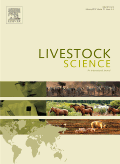
Livestock Science
Advancing Knowledge in Animal Science and Veterinary MedicineLivestock Science is a prestigious academic journal published by ELSEVIER, dedicated to the comprehensive study of animal science and veterinary medicine. With an esteemed Q1 ranking in both the fields of Animal Science and Zoology, as well as Veterinary (miscellaneous) in 2023, this journal is recognized for its impactful contributions to the understanding of livestock health, production, and management. The journal has consistently earned its high position within Scopus, ranking 26th out of 194 in General Veterinary and 86th out of 490 in Animal Science and Zoology, reflecting its significant influence within the research community. The open access policy allows for broader dissemination of knowledge, promoting collaboration among researchers, professionals, and students alike. With its continuous publication cycle from 2006 to 2024, Livestock Science remains an essential resource for anyone interested in the advancements, challenges, and innovations within the field of livestock management and veterinary practices.

INDIAN JOURNAL OF ANIMAL SCIENCES
Pioneering research for the challenges in animal sciences.INDIAN JOURNAL OF ANIMAL SCIENCES, published by the Indian Council of Agricultural Research, is a vital resource for researchers and professionals in the fields of animal science and veterinary studies. With its ISSN 0367-8318, the journal has been in circulation since 1971, providing a platform for innovative research and scholarly discourse. Despite its current Q4 ranking in Animal Science and Zoology and a Q3 ranking in Veterinary (miscellaneous), the journal aims to enhance its impact by promoting high-quality research that addresses the challenges in animal husbandry and veterinary practices in India and beyond. The journal does not operate under an Open Access model, which may limit certain dissemination opportunities; however, it remains indexed in Scopus, with a focus on elevating the standards of animal sciences. The INDIAN JOURNAL OF ANIMAL SCIENCES is pertinent for anyone looking to contribute to or stay informed about significant developments in animal sciences.
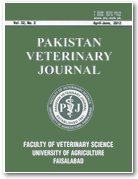
PAKISTAN VETERINARY JOURNAL
Empowering veterinary professionals through open access knowledge.Pakistan Veterinary Journal (ISSN: 0253-8318, E-ISSN: 2074-7764) is a leading peer-reviewed academic journal published by the University of Agriculture, Faculty of Veterinary Science, situated in Faisalabad, Pakistan. Since its inception, the journal has embraced an Open Access policy, facilitating the dissemination of vital research findings to a global audience and enhancing the visibility of veterinary science. With an impressive Q1 ranking in the veterinary miscellaneous category, the journal ranks #27 out of 194 in the veterinary general field according to Scopus, placing it in the top 14% of the discipline. The scope of the journal encompasses a wide array of topics relevant to veterinary medicine, ensuring that it serves as an essential resource for researchers, professionals, and students alike. By providing a platform for high-quality research from 2009 to 2024, the Pakistan Veterinary Journal continues to play a pivotal role in advancing veterinary science, promoting collaboration among scholars, and addressing contemporary challenges in animal health and welfare.